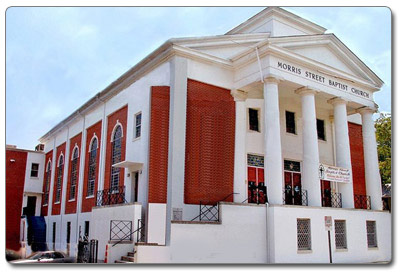In Charleston, new life for a heritage park
The loss of a beloved neighborhood park can cast a long shadow. Public parks help create a community’s sense of place; they’re a shared space where people get together to play and talk and enjoy the natural world, even if “nature” is just a sliver of green surrounded by a busy city. Parks are entwined in the life and history of a place, and are often regarded with deep reverence and affection by the people whose lives are bound up in them. Take away a park and you uproot a community.
That’s what nearly happened to the neighborhood surrounding DeReef Park, an urban oasis in Charleston established in the 1980s with support from the Land and Water Conservation Fund (LWCF). Named for two brothers who were prominent 19th century black leaders, DeReef Park provided vital public space for an historic, predominantly African-American neighborhood that was the epicenter of Charleston’s civil rights movement.

Morris Street Baptist Church
Founded May 9, 1865, this historic African-American church just off Charleston’s King Street looks out over DeReef Park.
On the park’s borders are numerous sites of historic significance, including Morris Street Baptist Church, one of the first African-American churches created in South Carolina after the Civil War; the site of the Brooks Motel, which hosted Martin Luther King, Jr. and Ralph Abernathy on their organizing visits to Charleston; the Francis P. Seignious House, the longtime home of an African-American women’s organization that can trace its roots back to the Underground Railroad; and the Cannon Street YMCA, sponsors of the Cannon Street All-Stars, the renowned little league baseball team that advanced to the 1955 World Series after all of the white South Carolina Little Leagues refused to play them.
The idea for DeReef Park took shape to provide a densely packed neighborhood a much needed place for recreation and reflection close to home. In 1981, the City of Charleston purchased nearly an acre of land with a federal grant from LWCF, providing the community with the space for its long-awaited park. As a condition of federal support, covenants were placed on the property to preserve it as parkland forever.
A decade later, however, the city conveyed DeReef Park’s acreage to a developer as part of a land swap, and then obtained approval from the National Park Service (the guardian of the LWCF) to remove protections from most of the land and transfer them to a smaller park, more than a mile away in a tourist district. In place of the lost park space, rose a high-end housing development.
A citizen’s group, Friends of DeReef Park, rallied the neighborhood and reached out to SELC, and our research uncovered several legal violations in the removal of the park covenants. Working closely with the Georgetown Law Center’s Institute for Public Representation, which argued the case in court, we negotiated a favorable settlement after the National Park Service conceded that it had violated the law and agreed to reconsider its decision.
The settlement protects a large portion of the original DeReef Park site and adds adjacent parcels to offset acreage lost in the development transaction. In addition, it requires the refurbishment of an abandoned African-American “praise house” in the park. Praise houses, once common in South Carolina, were places of worship for enslaved African Americans and became the cradle of the Black church. The restored DeReef praise house will commemorate the neighborhood’s remarkable history and serve as a public meeting place for the community.
The recovery of DeReef Park has lasting significance. Acknowledging the park’s importance to the city’s African-American population, who viewed its dismemberment as deeply disrespectful, the restoration of DeReef Park helps redress what the Charleston Post and Courier called “a raw deal” for the neighborhood. In addition, the case is one of the only LWCF cases ever brought and won addressing a significant problem: the casual lifting of park protections to facilitate lucrative development. The DeReef precedent shows that unlawful removal of park covenants can be challenged in court and overturned, thereby helping deter future abuses and fulfilling the program’s goal of providing permanently protected outdoor space for every American.
In Charleston, the positive resolution of the case has given new life to a prized park and allowed the DeReef neighborhood to celebrate its long-awaited return.
